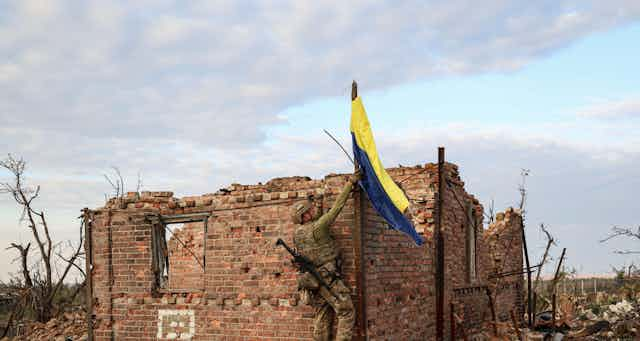From some of the headlines of late, you might be forgiven for assuming that the worst was past for Ukraine’s assault troops. That recent advances by Ukrainian forces constitute “breakthroughs” or “breaches” and that it’s all downhill from here.
Ukraine has recently claimed to have taken a couple of small villages, Andriivka and Klishchiivka, near the totemic remnants of Bakhmut the city in eastern Ukraine where, since August 2022. So many on both sides have given their lives for so little ground. This latest success, apprently, is another “important breakthrough”.
But aren’t they all? Ukrainian president, Volodymyr Zelensky, declares that the capture of ravaged, wrecked villages with pre-war populations of a few hundred are “significant” or “strategically important”.
In fact, there is nothing particularly strategic about either village. Their capture will not significantly affect the outcome of the war. But what choice does Zelensky have but to proclaim these small gains as a triumph? And what choice does Ukraine have but to continue this bloody grind?
1916 redux
Every month the resemblance to the slaughter of the first world war grows stronger – particularly the relentless bloody Somme offensives of 1916, where liberating now-forgotten villages such as Pozieres, Fricourt, Beaumont Hamel or Thiepval cost thousands of dead. A report in the New York Times in August estimated Ukraine’s military losses at 70,000 killed and more than 120,000 wounded. The casualty count has reportedly increased significantly since Ukraine began its counteroffensive.
Meanwhile, as in 1916, a parade of western generals have repeatedly made unrealistic promises. The Ukrainians would be in Crimea by the end of the summer, we were told. Now it’s “just one more push” that will cause the Russian army to “crumble”. These predictions are always suitably couched in vague conditions, of course.
The Russian army won’t crumble, and the Ukrainians aren’t going to be in Crimea this Christmas – or even next. Many of these same generals promised us much the same result with similar rhetoric in Iraq and Afghanistan.
It has never been in Ukraine’s interests for this to be a long war. And, with risks of many forms of escalation ever present, it certainly isn’t in the west’s.
No quick victory
But this is what it must face. It should be clear by now that there are not going to be major breakthroughs. Ukrainian tanks won’t be freed any time soon to range behind Russian lines. Neither will “gamechanging” weapons fundamentally alter the battlefield.
The Javelin and NLAWS anti-tank missiles, the M777 155mm howitzer, the Himars long-range missiles system, the gift of a few MiG 29 fighters, a few dozen German Leopard tanks, 14 British Challenger tanks, 31 US Abrams tanks, a small number of Patriot anti-aircraft missile batteries, the British Stormshadow and German Taurus cruise missiles – I may have missed some – have all been “gamechangers”, apparently.
And yet the “game” remains largely unchanged. This is because single weapons systems may win battles, but do not win wars.
Perhaps the biggest “gamehcnager” is the regularly announced and re-announced 60 or so secondhand F-16 fighters to the Ukrainian air force. Less well publicised is the fact that these will not be in a position to be operationally effective until 2025 at the earliest.

The reasons for this are superbly explained by the UK’s leading air power expert, Justin Bronk of the military think tank Rusi, who describes how the F-16 is a highly complex system requiring extensive training and years of experience for its potential to be drawn out.
We have already seen similar rhetoric being applied to the long-range ATACMS rocket artillery systems, which the US is likely to grant to Ukraine with – as with all the other “gamechangers” – a great deal of US reluctance.
Will to win
The key element in this kind of war, as in every war, is the will to fight combined with the means (including new equipment). The single essential enabler in Ukraine’s military effort – and the only real “gamechanger” – has been Elon Musk’s Starlink satellite system. Without the secure means to communicate that it has so far offered every Ukrainian military unit, Ukraine would be in a very different position. If units cannot talk to each other or to their command and control centres, they are in serious trouble.
Both sides are developing and reacting to each others’ technical advantages. The Russians are not stupid, have no desire for defeat and are matching many of Ukraine’s innovative and effective approaches.
They have a strong history of learning from mistakes and battering their way to some form of success.
What’s more, following South Korea’s “loan” of artillery ammunition to the US, the likely deal between Vladimir Putin and Kim Jong-un was entirely predictable. It will ease Russia’s concerns about ammunition, which is the key to this phase of the war.
Horrors to come
After the disasters of the Somme in 1916, even worse bloodbaths awaited the following year at Passchendaele and Verdun. As its army advances, Ukraine can expect similar horrors (though of a smaller scale) on its planned drive south to cut of Russia’s land bridge, at Tokmak or Melitopol – or other places most have yet to hear of.
I asked a friend in Kyiv, with the deaths of over 70,000 soldiers in mind how willing were people to carry on. “If we lose the war, we will lose the whole country,” she said “Everyone understands this.”
She pointed out that polls in Ukraine indicate that more than 90% oppose doing a deal with Russia.
Thankfully, some level of realisation of the inevitability of a long war is starting to percolate through western military staff. The west must hope that the people of its democracies understand the implications of the long war ahead. They must also hope, too, that their leaders are up to the challenge.

